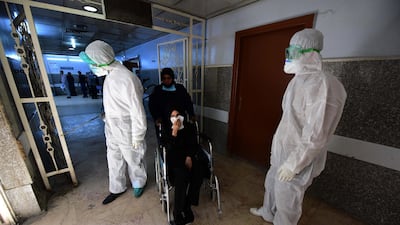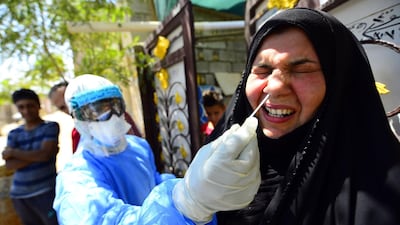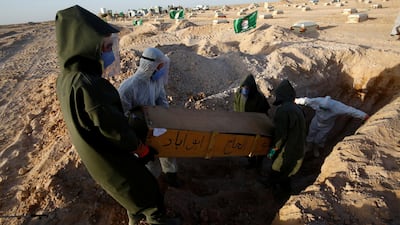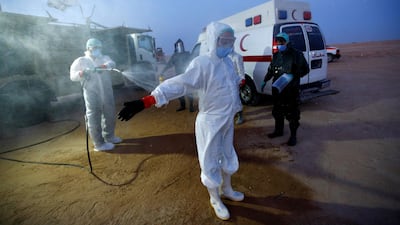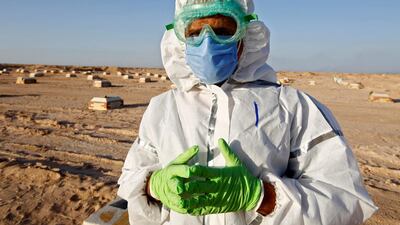Under the scorching heat of Iraq’s summer sun, at least four bodies of Covid-19 victims lay under sheets outside a Baghdad hospital morgue.
Nearby, the doors of one section of the mortuary lay open, the cooling systems inside are broken. The temperature in Baghdad hasn’t dropped below 40 degrees Celsius in weeks.
“They are here from yesterday under the sun,” says a man in a video shared widely on social media. Stood outside the mortuary of Al Kindi Hospital, he cries as he uncovers the body of his uncle.
“The mortuary is full, we are waiting for a car to pick them up,” the weeping man says.
The recent spike in coronavirus cases across the country has put Iraq’s healthcare system – decimated by decades of war, sanctions and corruption – on the brink of collapse.
Rundown hospitals, many built between the late 1970s and early 1980s, are overflowing. Most medicines and medical supplies are only available on the black market and medical staff are dying due to a lack of protective measures.
Desperate Iraqis are sending out appeals on social media seeking medicine, blood plasma and empty beds for loved ones suffering the effects of Covid-19.
One online video shows people scuffling over oxygen tanks outside a hospital.
The Director of Al Kindi Hospital, Dr Salim Al Bahadli, defended his hospital's decision to keep the dead outside the morgue, saying there were concerns over keeping infected bodies with those who died from other causes as it could pose a threat to families collecting their deceased.
"We are in a crisis that forces us sometimes to make decisions that evoke feelings and strong opinions and this has been the case in other countries in the world," Dr Al Bahdli told The National in a phone interview, saying his staff and hospital are under huge pressure since the outbreak.
“The situation at many of Iraq’s hospitals deteriorated rapidly, as waves of new cases exposed their capacity to cope with extraordinary pressure and overwhelmed their overworked and under-resourced staff,” a report last month by Enabling Peace in Iraq (EPIC), a US-based NGO that works in the country, said.
The research painted a grim picture of how mismanagement of the coronavirus outbreak in Iraq threatens to buckle the health system.
Daily cases have increased rapidly since mid-May when authorities eased stay-at-home restrictions.
The official number of confirmed cases on May 8 stood at 2,603. As of July 8, the official number stood at 67,442. New daily cases have hovered around 2,000 since late June. So far there have been 2,779 confirmed deaths.
But, like with many countries in the region and around the world, limited testing is likely hiding the true scale of the pandemic in Iraq. EPIC warns that if the country continues on this path, more than 2.8 million Iraqis could be infected in late July or August.
Ali Al Askari contracted Covid-19 in the latest wave of infections. Last Thursday, the 26-year-old rushed his patents and grandmother – whose condition worsened – to the hospital, while the rest of the family stayed home with mild symptoms.
Arriving at Al Hussein Hospital in southern Iraq’s Nasiriyah, his grandmother, in her 50s, couldn’t walk inside.
"But there was no stretcher," Mr Al Askari tells The National by phone from his hospital bed in the same facility through fits of coughing. "There were no free beds and we had to lay her on the ground," he added. From there, they carried her – and a tank of oxygen – up the stairs to the isolation unit.
The next day, as her condition deteriorated, Mr Al Askari's grandmother was moved to an Intensive Care Unit. But she died, waiting in the corridor for a space.
Like other victims, her body was kept at the morgue for several days to confirm the cause of death before being released for burial.
Authorities have ramped up Covid-19 testing for bodies because rumours of a future compensation package for victim’s families has led to reports of false death certificates being bought to cite coronavirus as the cause.
Ambulances or refrigerated trucks carrying piles of bodies arrive daily at Iraq’s largest cemetery in the southern city of Najaf. Convoys take a special unpaved road to bypass the city’s inhabited areas.

A 6,000-square-meter piece of land on the edge of Wadi Al Salam cemetery has been set aside for Covid-19 victims.
Teams from the Shiite paramilitary Popular Mobilisation Forces (PMFs) forces receive the dead and prepare the last rights.
At the start of the crisis, volunteers from the Imam Ali Brigade say they were burying up to five bodies a day.
That number has jumped to between 90 to 100 a day since late May, says Brigade Commander Tahir Al Khaqani.
It’s a grim job. Some bodies reach the cemetery already decomposing due to hot weather and limited cold storage. Others arrive wrapped only in blankets and sheets instead of body bags, Mr Al Khaqani says.
Some families, he adds, have been given the wrong body at the overcrowded hospitals.
Believing the worst is still ahead, the brigade is training more volunteers to help its burial teams. A fourth site for the important washing of the bodies before burial will be added soon.
Since his grandmother’s death, most of Mr Al Askari’s family decided to continue their treatment at home where they feel safer. But his grandfather took a turn for the worse and is now in the intensive care unit. The hospital say they can't provide oxygen so the family are buying it from the black market, paying up to $8 for frequent refills – 17 times on Wednesday alone.
“The situation at the hospital is tragic. The staff are exhausted and [there are] no services,” Mr Al Askari says. “It’s like a sinking boat.”
